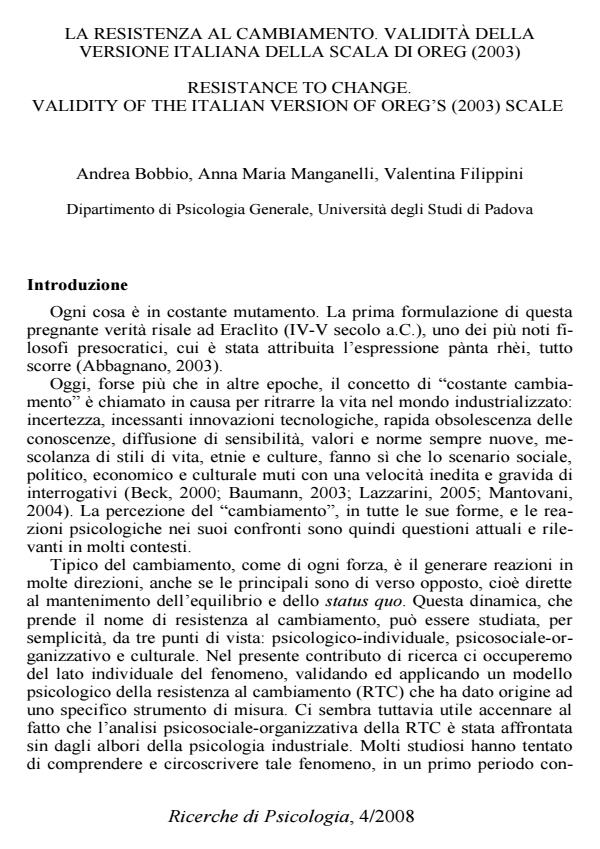La resistenza al cambiamento. Validità della versione italiana della scala di oreg (2003)
Titolo Rivista RICERCHE DI PSICOLOGIA
Autori/Curatori Andrea Bobbio, Anna Maria Manganelli, Valentina Filippini
Anno di pubblicazione 2009 Fascicolo 2008/4
Lingua Italiano Numero pagine 24 P. 7-30 Dimensione file 721 KB
DOI 10.3280/RIP2008-004001
Il DOI è il codice a barre della proprietà intellettuale: per saperne di più
clicca qui
Qui sotto puoi vedere in anteprima la prima pagina di questo articolo.
Se questo articolo ti interessa, lo puoi acquistare (e scaricare in formato pdf) seguendo le facili indicazioni per acquistare il download credit. Acquista Download Credits per scaricare questo Articolo in formato PDF

FrancoAngeli è membro della Publishers International Linking Association, Inc (PILA), associazione indipendente e non profit per facilitare (attraverso i servizi tecnologici implementati da CrossRef.org) l’accesso degli studiosi ai contenuti digitali nelle pubblicazioni professionali e scientifiche.
La resistenza al cambiamento. Validità della versione italiana della scala di oreg (2003) - The aim of the study is to propose the Italian version of the multifactor resistance to change scale (RTC) developed by Oreg (2003), and to examine its psychometric properties. The research was conducted via self-administered questionnaires on a group of 324 adults, men and women, currently employed. Correlations were computed between RTC and measures of personality factors (Big Five), sensation seeking, need for cognitive closure, emotional control, cognitive abilities, and political orientation. Then, the correlation between RTC and social desirability was computed. Moreover, differences in RTC scores between sub-groups with a different amount of change experiences were analysed. Finally, via multiple regression analysis, the best predictors of RTC were identified. RTC factorial structure, made up of four first-order factors and a single second-order factor, was supported by confirmatory factor analysis results. The internal consistency was also acceptable. RTC measure was negatively correlated with extraversion, agreeableness, emotional stability and openness (Big Five), sensation seeking, and emotional control. The correlation between RTC and need for cognitive closure was high and positive. The correlation between RTC and social desirability was week and negative, and no correlations at all resulted between RTC, cognitive ability and political orientation. Participants with a high number of change experiences had a lower RTC scores when compared with those with a low number of change experiences. Finally, need for cognitive closure was the most important predictor of resistance to change score.
- Bureaucratic Red Tape and Technostress: Hierarchical Control in Technology Adoption and Employee Well-Being, and the Dual Moderating Role of Resistance to Change as a Demand or an Overlooked Resource Diego Bellini, Barbara Barbieri, Marina Mondo, Federica Batzella, Jessica Pileri, Max Rapp-Ricciardi, Silvia De Simone, in International Journal of Public Administration /2026 pp.1
DOI: 10.1080/01900692.2025.2596643 - Flexibility Competence Assessment: A Systematic Literature Review Sibilla Montanari, in Education Sciences /2025 pp.1118
DOI: 10.3390/educsci15091118 - Job insecurity, subjective well-being and the moderating role of locomotion Andrea Bobbio, Anna Maria Manganelli, Silvano Cannone, in Giornale Italiano di Medicina del Lavoro ed Ergonomia /2025 pp.42
DOI: 10.4081/gimle.603
Andrea Bobbio, Anna Maria Manganelli, Valentina Filippini, La resistenza al cambiamento. Validità della versione italiana della scala di oreg (2003) in "RICERCHE DI PSICOLOGIA " 4/2008, pp 7-30, DOI: 10.3280/RIP2008-004001